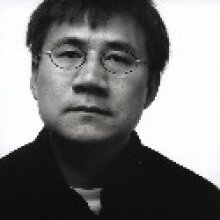
In today’s Chinese poetry we find some remarkable imagery: Bei Dao’s needle sliding across a tree’s growth rings towards the centre; Duoduo’s plow hung with pearls, Xi Chuan’s humourless monster. Yu Jian, on the other hand, declares war on the metaphor, using language as a self-aware, dangerous caricature which can reduce a human being to substantives particles syllables past time. The poetry of Xiao Kaiyu, settled in Germany in 1997, distinguishes itself from both these contrasting trends.
From ‘Saturday Night’:
In passing he mentions his mother’s funeral,
many relatives, many firecrackers, many
unknown children, but very little time
spent by relatives around her portrait exchanging grief.
In China, Xiao is considered a ‘narrative’ poet, like Sun Wenbo and others whose work caught on in the 1990s, first in the samizdat circuit, later also in regular publications. Xiao has also made his name as a critic. He says the principal question is what one writes rather than how one writes it, thus firmly distancing himself from the metaphorists and the language-squeezers. What one writes: experienceable and experienced reality, socially and morally committed. Thus in content his poetic creed has much in common with classical Chinese poetry - from which it differs in the form of his poems, which is mostly free verse. However, Xiao’s work may have its roots in a recognizable world, but no more than classical Chinese poetry is it a simple reflection of that world. And apart from the ‘narrative’, there is a lyrical Xiao Kaiyu, in a short poem like ‘Ahh, Mist’, and an imaginative one, in ‘Northern Station’, who feels himself ‘a crowd of people’: ‘I sense there’s another pair of feet in mine’. Xiao Kaiyu is a versatile poet. His work has been translated into German, English, Italian and Dutch.
[Xiao Kaiyu took part in the Poetry International Festival Rotterdam 2002. This text was written on that occasion.]
On Lyrikline you can find additional information (in German) about Xiao Kaiyu and hear him read his poems.

